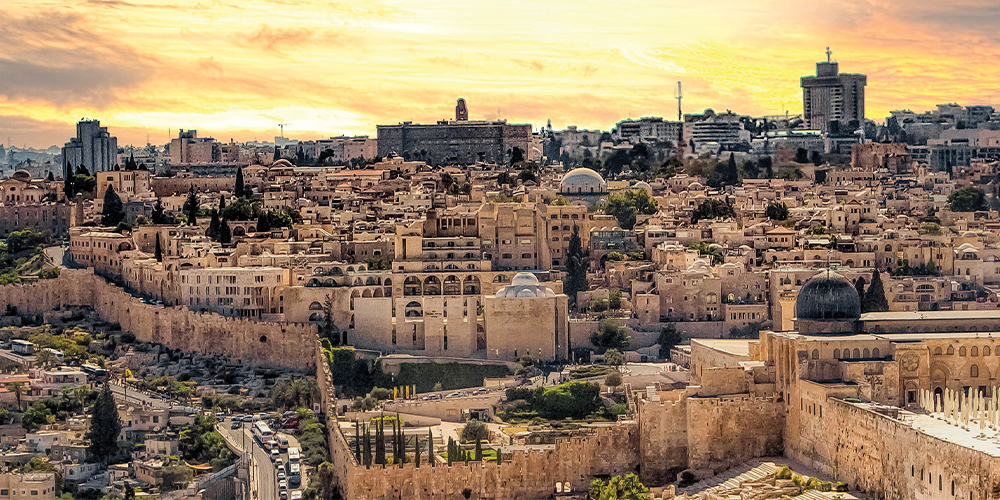 |
Differentiating between the state of Israel and the Israel of promise.
Who are the citizens of the Israel that fulfills God’s promises to rebuild a nation of Israel as his people?
This question became a topic of considerable discussion last October when people were responding to the horrific Hamas attack on Israeli civilians. Many Christians believe that they have a special responsibility to support the state of Israel because they see its present state as a fulfillment of prophecy. They expect the Jewish people to play a key role in the events of the great tribulation and the millennium. They look for a largescale conversion of the Jewish people to Christ. But is this view biblical?
This brief article will not attempt to respond to the many political, historical, and humanitarian aspects of this crisis in Israel. It deals primarily with the question of the relationship between the state of Israel and the Israel of promise.
Political entity or community of faith
In Amos 9:14,15, the Lord promises a restoration of the nation of Israel: “I will restore the fortunes of my people Israel, and they will rebuild the desolate cities and dwell in them. . . . I will plant them in their soil, and they will never again be uprooted from the soil that I have given to them, says the LORD your God.” Amos says that although the political kingdoms of Israel and Judah will be destroyed and the royal house of David will no longer rule on the throne of Judah, there will be a spiritual restoration, rebuilding, and expansion of Israel. This will not be a political kingdom or a time of material prosperity, but the building up of the spiritual Israel through the church of Jews and Gentiles. This is made clear in Acts 15:15-17 where James says that the fulfillment of Amos’ prophecy began with the missionary work of the apostles that brought Gentiles into the church along with Jews.
The Israel that fulfills prophecy is the Israel of faith, not the political state of Israel. Membership in the spiritual Israel is based on faith, not on physical descent. This is discussed in great detail in Romans chapters 9–11. Paul addresses the apparent contradiction between the promises to David and the low condition of Israel in his own day: “This does not mean that God’s word has failed, because not all who are descended from Israel are really Israel, and not all who are descended from Abraham are really his children. This means that it is not the children of the flesh who are God’s children, but it is the children of the promise who are counted as his descendants” (Romans 9:6-8). In Galatians, Paul addresses the recipients of his letter as the Israel of God: “In Christ Jesus circumcision or uncircumcision does not matter. What matters is being a new creation. Peace and mercy on those who follow this rule, namely, on the Israel of God” (6:15,16).
Many other passages confirm this understanding of the promised Israel of faith, including John 8:31-47; Romans 2:28,29; Romans 4:11-13; Galatians 3:7,26-29; Ephesians 2:11-22; and Philippians 3:3. This teaching runs throughout the New Testament.
This distinction between Israel as a political entity and Israel as a community of faith is not unique to Christians. It has been recognized also by many Jews. From the founding of political Zionism in the 1890s, many Haredi Jewish leaders have objected to the movement’s secular orientation. This was chiefly due to the concern that secular nationalism would redefine the Jewish nation from being a religious community based on its allegiance to God—for whom adherence to religious laws was the essence of the nation’s task, purpose, and right to exist—to being an ethnic group like any other. Another factor was the belief that the Jews should not try to re-establish Jewish rule in the land of Israel before the arrival of the Messiah.
A Christian response to the crisis
If the Bible does not teach that Christians have a theological responsibility to the state of Israel, how do Christians respond to the crisis in the Near East?
First of all, Christians, whether they are Jewish or Gentile, have a special affection for the Jewish people because they were the avenue that God chose to deliver salvation to the whole world. Paul says, “I have great sorrow and continuous pain in my heart. . . . [From the Israelites] are the adoption as sons, the glory, the covenants, the giving of the law, the worship, and the promises. Theirs are the patriarchs, and from them, according to the flesh, came the Christ, who is God over all, eternally blessed” (Romans 9:2-5). Jesus told the Samaritan woman: “A time is coming when you will not worship the Father on [Mount Gerizim] or in Jerusalem. . . . We worship what we do know, because salvation is from the Jews. But a time is coming and now is here when the real worshippers will worship the Father in spirit and in truth, for those are the kind of worshippers the Father seeks. God is spirit, and those who worship him must worship in spirit and in truth” (John 4:21-24).
Beyond that, we must judge Israelis and Palestinians, along with their allies and supporters, by the same standards that we use to judge any nation and any military action. Here are a few principles to consider.
The God of the Bible hates, condemns, and promises to punish atrocities in war such as torture, enslavement, attacks on pregnant women, and desecration of bodies (Amos chapters 1 and 2). He does hold his people to a higher standard.
Governments have the right and duty to protect their citizens and other innocent victims of an attack. They may wage war to do so. Though no nation and its combatants ever act in a purely just way, there is such a thing as a just war. Civilized nations have a recognized set of criteria for a just war, and they hold the perpetrators of war crimes responsible for their actions. There is a moral difference between indiscriminate attacks on civilian populations and unintended killing of civilians whom the attacking forces were trying to avoid.
War is the closest thing to hell on earth. Governments should make every effort to avoid it except as a last resort and in self-defense. We grieve especially for the innocent victims of war crimes, but we also grieve for the innocent victims among the aggressor nations. Innocent young men in Eastern Europe were dragooned into Hitler’s army just because they had German last names. The Japanese used innocent civilians on Saipan and Okinawa as human shields and drove them to suicide. The Allies could not avoid killing innocent people in these cases. Civilized nations try to minimize the damage of such cases, and they must guard themselves so that hatred and revenge do not lead them to such evil practices themselves.
War is hell, and we pray that God will spare all people from this evil. But we know that there will always be wars and rumors of wars. We pray that when war cannot be avoided, God will protect the innocent and defeat the evil, and that if we must participate in a war, we will always strive to protect the good and oppose the evil.
Scripture references used in this article are from the Evangelical Heritage Version.
Author: John Brug
Volume 111, Number 1
Issue: January 2024







